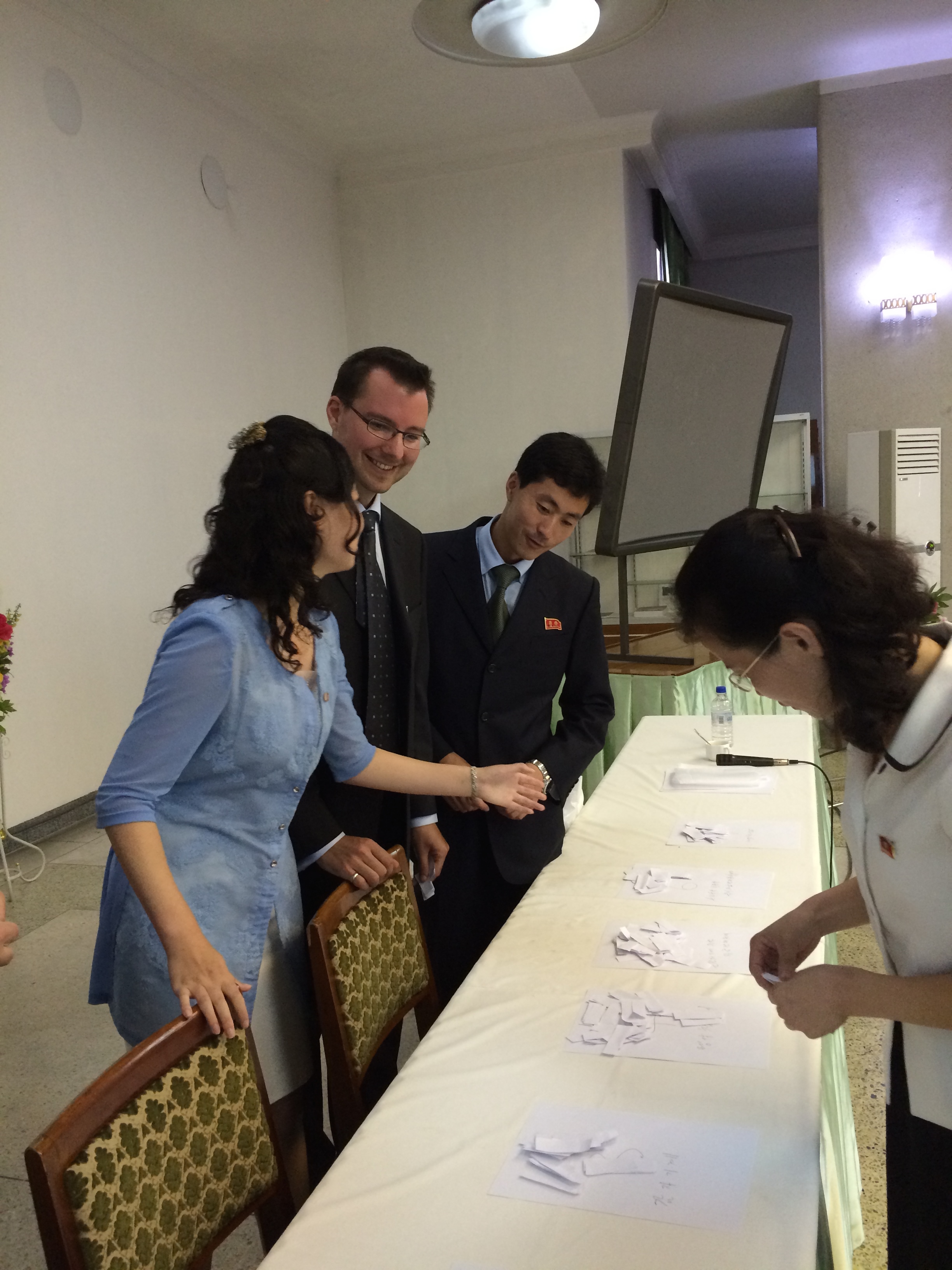Korean participants play Angel Investors by investing fake money in ideas other participants created and pitched in a workshop
We just completed a two-week workshop in North Korea as part of our “Tech Start PY” program in August. Tech Start PY is focused on helping build an entrepreneurial culture and a supportive environment for startups in North Korea.
Tech entrepreneurship in North Korea might seem to be an odd notion. This, after all, is an industry that requires Internet access and smartphone usage. Entrepreneurs also need to be plugged into a highly connected global network of venture capitalists, entrepreneurs, programmers and users to compete at the cutting edge. Despite the handicaps that they face, Korean researchers and businesspeople were keen to learn about the topic and especially how they can commercialize research. The researchers we interacted with admit that they lack entrepreneurial experience, and hope to gain exposure to entrepreneurs and venture capitalists to bridge the divide between research and industry.
Connectivity is Key
While Korea has programmers who are technically proficient, workshop leaders emphasized that they cannot build successful tech-oriented business without connectivity. They need to be able to see in practice how customers use products on their mobile phones and on the web. They need to see what products are on the market, and need to interact frequently with programmers, venture capitalists and other entrepreneurs to understand where the market opportunities are. Moreover, they need to understand who their competitors are.
This problem became evident during small group consultations we ran, where 2 or 3 Koreans could approach an idle workshop leader during another lecture. A small company pitched an optical character recognition (OCR) software they were developing, which scans images, recognizes characters and converts them into text. They have been developing the product for more than a year, and wanted investors to fund the completion of the product. A workshop leader said 'hey, I have something like that right here,' and showed a year-old OCR app he had on his ipad. The product manager immediately realized that his software would not be competitive with what has been on the market for a year already. The workshop leader suggested that they could partner with a company with an existing product, and carve out a niche by working on Korean text recognition. This, as they understood, would require a degree of research into the field - something they seem not to have been able to do.
We were also proud to be (probably) the first to introduce participants to venture capital firm KPCB Mary Meeker’s excellent report on tech trends.
On an non-workshop day, we were taken to see Unjong Technology Zone, just north of Pyongyang, which the Academy of Sciences ambitiously hope will flourish into a North Korean Silicon Valley someday. One idea we broached during the workshop seemed to fit in with that aspiration.
Incubators as Test Beds
Participants quickly became excited about the concept of an incubator, an environment that would help turn ideas into products. While promoting the usefulness of incubators, we also pointed out that a successful incubator, which brings together startups, technology, support services, funding and training under a suitable incentive structure, is a microcosm of the larger ecosystem they need to create for businesses and investors.
Participants often focus too much on hard infrastructure (e.g. the incubator facilities), and not enough on soft infrastructure (e.g. the networks, mentorship and business environment – i.e. the entrepreneurship ecosystem). The former is a lot more visible as a milestone - certainly in a country with minimal internet access - and easier to set up. But a workshop leader with policy experience emphasized that the latter is far more important, and far more difficult to create. Some forward-thinking participants were able to grasp the value of an incubator space that would allow them to gain exposure to entrepreneurial skillsets, demonstrating that they were thinking about tackling the soft infrastructure problem already. We are keen to continue helping the Korean participants learn more about incubators, and perhaps support them in setting up one if the conditions are right.
For the August program, we had a strong team of workshop leaders, including successful venture capitalists that founded companies with successful exits, founders of incubators, and policymakers developing entrepreneurship ecosystems in Asia. The general impression was one of tremendous opportunity once restraints are relaxed.
Around 40-50 Koreans attended the two-week program, and represented a diverse cross-segment of the tech sector, from researchers and aspiring entrepreneurs, to entrepreneurs, business managers, and IT association representatives. Who knows, maybe we'll see some of them in that DPRK-Silicon Valley, working in hoodies, playing foosball on their lunch and taking breaks in nap pods. Or if that's a cultural step too far, at least starting small companies and getting them growing.

